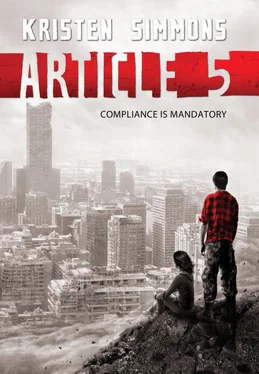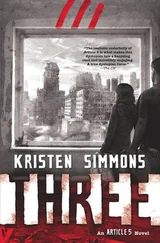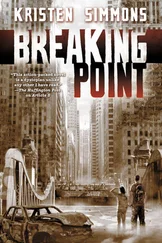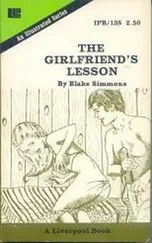There was hardly enough room to walk here. Chase came close, and though his expression was dark, I knew he was more comfortable than me. After Chicago had been bombed, he’d survived in places like this. Places where people had congregated after being displaced from the major cities.
“Watch your back,” he warned me. “And mine, while you’re at it,” he added, tightening the straps of the pack. He’d moved the money to his front pocket.
“Where do we start?” I asked. This was the biggest city I’d ever seen. No matter how large the resistance here, we were searching for a needle in a haystack.
“Follow people in dirty clothes,” he said. “They’ll lead us to food, and where there’s food, there’s people talking.”
He was right. We walked for several city blocks, finding ourselves part of a massive stream of hungry people. Every telephone pole, fence, or door displayed a prominent posting of the Moral Statutes. We crossed the train tracks and came to a place called Market Square, a long cement strip lined by flat-faced brick buildings that might once have been shops but were now hostels, medical stations, and abandoned buildings.
The crowd grew denser toward the back of the square. Thousands of people were here for food or shelter. Sisters, too, in their navy skirts and knotted handkerchiefs, bustling around the temporary cots of the Red Cross camp. I swallowed thickly, realizing this could have been me.
A dose of adrenaline shot into my veins when I caught a uniform from the corner of my eye. The clean, neatly pressed blue stuck out amid a sea of shabby garments.
Soldiers.
My eyes lingered, and I saw two more, standing behind an unmarked moving truck, unloading wooden crates of food. Their setup was positioned on the right side of a bottleneck, leading to the open space of the square. They didn’t try to hide their weapons; they were all armed and ready to fire upon anyone who might try to steal.
Chase had seen them, too. He lowered his head, trying not to look so tall. I scanned the crowd. Too many people were shuffling into the square; no one was going out. If we ran now, we’d cause a commotion and our way would be impeded by bodies. Besides, if the MM wanted to pursue us, they had guns. People would get out of their way a lot faster than they’d get out of ours.
We needed to get to the kitchen. Chase thought we’d be safe asking some discreet questions about the carrier there, and the only way to get there was to walk by the soldiers. We wouldn’t be locked in once we passed — there were exits in the back of the square that I could see from my vantage point — but it would be a tremendous risk. The soldiers would only be ten feet away.
I reached for Chase’s hand, and a quick squeeze asked the question I didn’t dare speak aloud. With only the briefest of hesitations, he squeezed mine back. We were going to pass them.
“Pull your collar up,” Chase commanded. I did so quickly. We shuffled forward, bodies bumping against us on all sides as we entered the bottleneck.
Please don’t look this way. I concentrated all my energy on the two soldiers.
“Eyes forward.” Chase’s voice was low enough that only I could hear. “Don’t stop.”
Sweat rained down my face, so contrary to the firm gust of cool evening air that blasted over the crowded square. A vice squeezed my temples.
Keep walking, I told myself.
I saw the soldiers in my peripheral vision, only ten feet away. One of the guards turned quickly, a radio glued to his ear. From the back I caught a glimpse of his light brown hair and narrow build, and an odd sense of familiarity crept over me.
Keep walking.
We passed by the crates of food and the soldiers and headed toward the open area of the square.
I fought the urge to turn around. Chase strode faster, pulling me around the corner on the damp sidewalk, out of the stream of pedestrians. It was quieter here, and I breathed for what felt like the first time in minutes.
“What are they doing here?” I asked. The MM provided the food for the soup kitchens at home but relied on volunteers to deliver it to the sites. I always thought this was because it was below them to mingle with poor people they didn’t have reason to arrest.
“The city must be on a supply crunch.”
“That explains the guns,” I commented wryly. The sooner we could get out of here the better.
As we resumed our path, I became acutely aware of how clean, how well fed, we looked. Single floaters loitering near the sidewalk stared resentfully at us like we were royalty. From their famished condition, I guessed that Chase was right about the supply crunch: There clearly wasn’t enough food to go around in this large city.
We passed a homeless man leaning against a loud generator outside a community restroom with a sign that read “anything helps.” He was emaciated. Ragged, stained clothing hung from his bony frame. Paper-thin skin lidded his deeply set eyes, and his face was masked by the olive-colored blotches of starvation.
Chase paused in front of this man, and for a moment I thought that he was going to give him some money. His generosity scared me. If Chase took out his wallet, these starving people would be on us like a pack of wolves.
An instant later Chase straightened and reached for my hand again, pulling me beside him.
“Stay close,” he said.
I jumped when I heard the scuffle behind us, and turned back, expecting to have to defend myself. My mouth dropped open. The pack of wolves had indeed descended, but they weren’t coming after us, they were closing in upon the man. The starving, homeless man. My anxiety rebounded, ten times more intensely than before, when I realized they intended to rob him. The palms of my hands dewed with sweat, but Chase’s grip held fast.
A man and a woman with sunken cheeks stole the man’s change cup and his cardboard sign. Another took his shoes. Another his soiled sweatshirt. When it was jerked off his body, folded Statute circulars fluttered into the air. He’d been lining his clothing with paper to keep warm.
The crumpled victim’s bare, ashen chest was revealed. His sticklike limbs were bent at awkward, contorted angles, but he remained as supple as a rag doll. Someone had probably knocked him unconscious, or he had been simply too weak to fight back.
“We have to help!” My voice was high with distress. This crime was intolerable. How would the man survive without the warmth of his clothing?
“There’s nothing we can do. If we stay, we’ll be next.” He urged me forward.
“Chase!” I yelped. I dug my heels in but could not pull him to a stop.
“It’s too late,” he said in a hard voice. At once, I knew what he meant.
The man was dead.
How long had he sat there, with no one checking on him, no one noticing how many days had passed since his last meal? A day? Two? A week ? How cold and foreign this city seemed, that even death could pass unnoticed.
And where were the soldiers now? Weren’t they meant to stop this?
The answer was all too clear. No . The MM would do nothing. They wanted the poor and unfortunate to kill themselves off. Less work for them that way.
An image of Katelyn Meadows filled my mind. What had the guards at the reformatory done to her body? Had she been taken back to her parents? Were her parents even still alive? I suddenly felt old, far beyond my years.
Chase pulled me through the skirmish. I felt as if I were floating. Like my feet barely touched the ground. I wanted to go to sleep and wake up in my bedroom at home, with my mother singing in the other room. I wanted to go over to Beth’s house to do homework and talk about anything and everything and nothing important. I wanted things that were impossible.
Читать дальше










